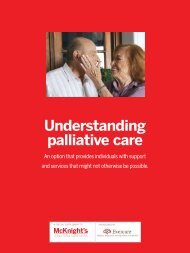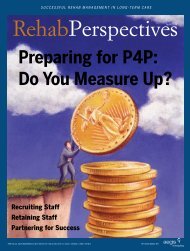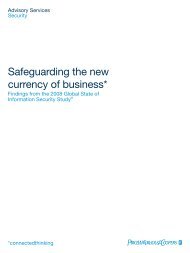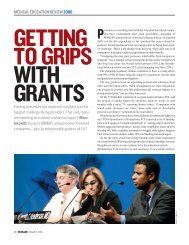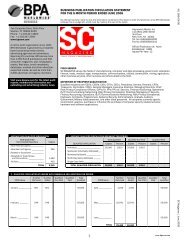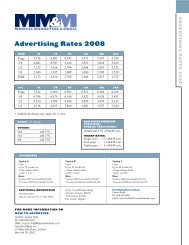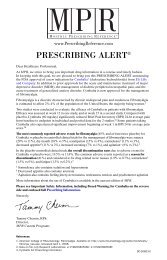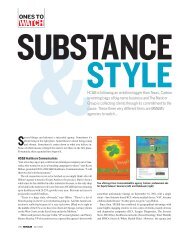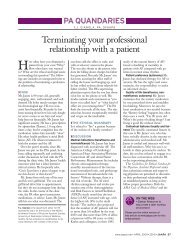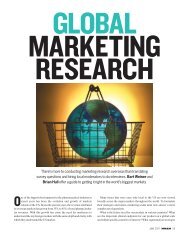Review - Haymarket Media Group
Review - Haymarket Media Group
Review - Haymarket Media Group
Create successful ePaper yourself
Turn your PDF publications into a flip-book with our unique Google optimized e-Paper software.
Commentary<br />
Inflammatory Breast Cancer: Still a Challenge<br />
Nancy U. Lin, MD<br />
Department of Medical Oncology, Dana-Farber Cancer Institute, Boston, Massachusetts<br />
Inflammatory breast cancer (IBC) is a relatively<br />
rare disease, comprising less than 3% of breast<br />
cancer cases in the United States. 1 Compared<br />
with locally advanced, noninflammatory breast cancer,<br />
IBC appears to be a distinct entity with a unique<br />
mode of presentation and underlying biology.<br />
Unfortunately, even with multimodality therapy, the<br />
prognosis for patients with IBC remains poor. 2<br />
Overexpression and/or amplification of HER2 is<br />
present in 25% to 30% of primary breast carcinomas. 3<br />
In contrast, HER2 is overexpressed in approximately<br />
half of IBC cases. 4,5 In all patients with breast cancer,<br />
Inflammatory breast cancer<br />
appears to be a distinct entity with<br />
a unique mode of presentation<br />
and underlying biology.<br />
overexpression of HER2 is associated with a higher<br />
risk of relapse and worse overall survival (OS) 3 ; however,<br />
the contribution of HER2 overexpression to the<br />
prognosis of patients with IBC is not well defined.<br />
Dawood and colleagues therefore set out to examine<br />
the prognostic significance of HER2 status in<br />
women with IBC diagnosed between 1989 and 2005<br />
20 The American Journal of Hematology/Oncology<br />
at the University of Texas M.D. Anderson Cancer<br />
Center. 6 In all, 179 patients fulfilled the inclusion/<br />
exclusion criteria for this retrospective analysis. A<br />
strength of the study is the relatively uniform treatment<br />
of the patients: all patients received an anthracycline,<br />
and nearly 80% received a taxane as part of<br />
their primary systemic chemotherapy. In addition,<br />
the exclusion of patients who received trastuzumab<br />
in the neoadjuvant or adjuvant setting allowed the<br />
authors to describe the impact of HER2 upon relapsefree<br />
survival (RFS) independent of an effective targeted<br />
therapy. Chemotherapy was followed by mastectomy<br />
and comprehensive radiotherapy in all patients,<br />
and hormonal therapy was given to patients with<br />
hormone receptor–positive disease. There was no difference<br />
in the rate of pathologic complete response<br />
(pCR) by HER2 status. After a median follow-up of 35<br />
months, 56% of patients with HER2-negative disease<br />
and 62% of patients with HER2-positive disease<br />
developed a disease recurrence, a difference that was<br />
not statistically significant.<br />
What could account for the lack of prognostic significance<br />
of HER2 for RFS described in this study<br />
compared with the reproducible influence of HER2<br />
status on prognosis in all-comers with breast cancer?<br />
One possibility relates to common characteristics of<br />
IBC present across breast cancer subtypes that lead to<br />
a more aggressive clinical phenotype. Using expression<br />
profiling, Bertucci and colleagues identified the<br />
same five molecular subtypes (luminal A and B,<br />
basal, HER2 positive, and normal breast-like) in IBC<br />
as have been observed in non-IBC. 7 At the same time,<br />
a single 109-gene set was able to distinguish between<br />
IBC and non-IBC within each subtype. These genes<br />
Dr Nancy U. Lin was invited to provide commentary on the following article: Dawood S, Broglio K, Gong Y, et al. Prognostic significance of<br />
HER-2 status in women with inflammatory breast cancer. Cancer. 2008;112:1905-1911.





